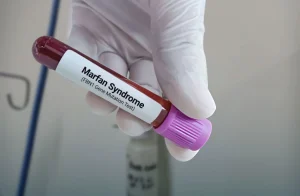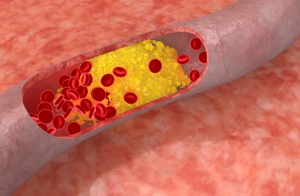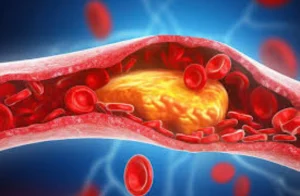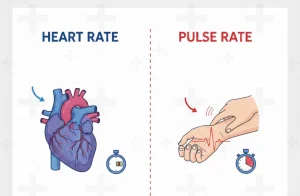The United States has witnessed a significant surge in Coronary Artery Disease (CAD) cases over the past few decades. According to the CDC, approximately 1 in every 20 adults aged 20 or older is affected by CAD, making it a pressing health concern.
Among the many questions patients and their loved ones ask, one stands out above the rest: “Can I survive this?” and more importantly, “What will my life expectancy be with CAD?” This isn’t just a clinical inquiry—it’s an emotional one, filled with uncertainty and a deep desire to understand the future.
What Does Diagnosing CAD Mean for Your Future?
Receiving a diagnosis of Coronary Artery Disease can feel like the ground beneath you has shifted. It’s natural for fear and uncertainty to creep in—what does this mean for your health, your family, and the years ahead?
The word “disease” alone can feel heavy, but it’s important to remember that a CAD diagnosis isn’t a verdict. Instead, it’s a wake-up call to take control of your health and shape a new path forward.
For some, this diagnosis comes as a surprise. Maybe there were no glaring symptoms, or perhaps they were written off as signs of stress or aging. For others, the signs might have been clearer—chest pain, fatigue, shortness of breath—but now that the condition has a name, the real question is, what’s next?
While it’s true that CAD is a chronic condition that requires lifelong management, it’s not a one-size-fits-all prognosis. Each person’s experience with CAD is unique, and many factors, including how early the disease was caught, the extent of artery blockage, and your overall health, will shape your future.
What Would Be Coronary Artery Disease Life Span?
The question of life expectancy with Coronary Artery Disease (CAD) doesn’t have a simple, one-size-fits-all answer. While CAD can reduce life expectancy, the extent of this decrease largely depends on when the disease was diagnosed and, crucially, how it has been managed over time.
Research sheds light on the range of outcomes. For instance, the American Medical Association (AMA) estimates that individuals with CAD may experience a reduced life span of around 10 years. However, it’s important to emphasize that this doesn’t mean everyone with CAD will live exactly 10 years less. These estimates depend on many factors, including the stage of the disease and how actively it’s treated.
On the flip side, other studies paint a more hopeful picture for those who adopt heart-healthy habits. Individuals who follow a healthy lifestyle—focusing on diet, exercise, and stress management—can significantly improve their prognosis. In fact, some research shows that adopting a heart-healthy lifestyle may even add more than 10 years to one’s life.
A 2023 report supports this by revealing a striking difference in life expectancy based on cardiovascular health (CVH). According to the study, at age 50, those with high CVH had a life expectancy of 36.2 years, while those with low CVH saw a much lower life expectancy of 27.3 years. This highlights the critical role of lifestyle choices in determining how long and well someone can live with CAD.
Here’s a well-rounded answer to “What Factors Can Improve Life Expectancy While Living With CAD?”:
Prevent heart problems before they start – Schedule a preventive checkup
Contact UsWhat Factors Can Improve Life Expectancy While Living With CAD?
A diagnosis of Coronary Artery Disease (CAD) can be daunting, but it’s important to remember that your future isn’t set in stone. In fact, there are several key factors that can significantly improve your life expectancy while living with CAD. By focusing on managing your condition and making proactive lifestyle changes, you can greatly enhance both the quality and length of your life. Here are the most important factors:
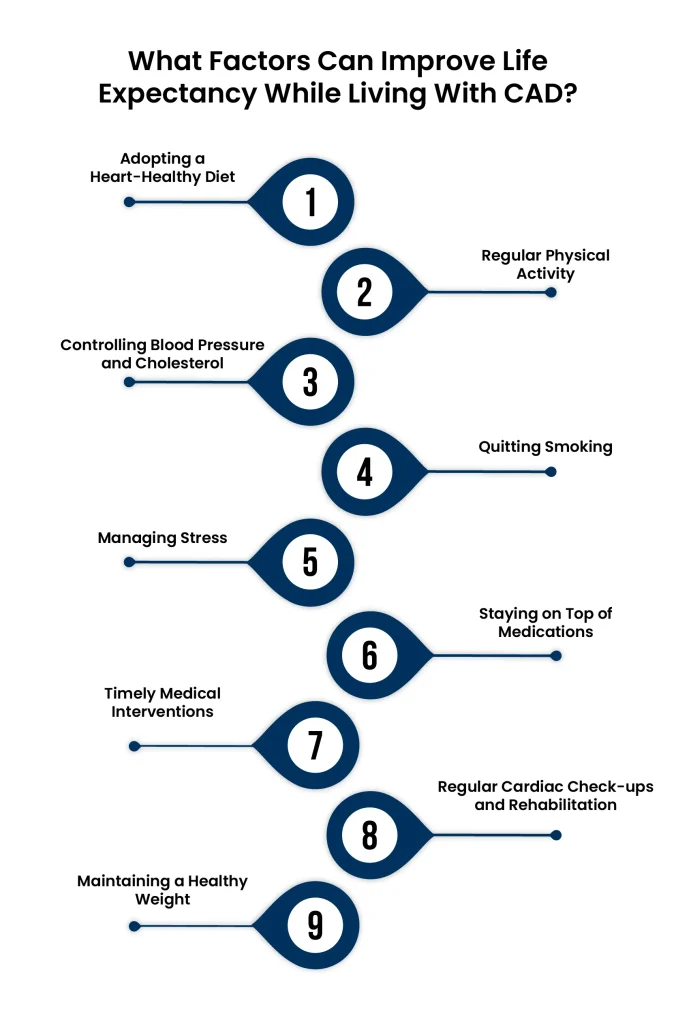
1. Adopting a Heart-Healthy Diet
One of the most powerful ways to improve your life expectancy is through a heart-friendly diet. This means reducing saturated fats, trans fats, and processed foods while increasing the intake of fruits, vegetables, whole grains, lean proteins, and healthy fats (like those found in fish and nuts). Diets such as the Mediterranean or DASH diets have been shown to reduce heart disease progression, helping patients live longer, healthier lives.
2. Regular Physical Activity
Exercise strengthens your heart, improves circulation, and helps maintain a healthy weight— all critical factors in managing CAD. The American Heart Association recommends at least 150 minutes of moderate-intensity aerobic exercise per week, such as brisk walking, cycling, or swimming. Regular physical activity has been proven to reduce the risk of heart attacks and improve long-term survival in people with CAD.
3. Controlling Blood Pressure and Cholesterol
High blood pressure and elevated cholesterol levels are major contributors to the progression of CAD. Keeping these numbers in check through lifestyle changes, medications, or a combination of both can significantly improve your life expectancy. Regular monitoring and working closely with your healthcare provider to adjust medications as needed is critical for long-term heart health.
4. Quitting Smoking
If you’re a smoker, quitting is arguably the single most important step you can take to improve your heart health and life expectancy. Smoking accelerates the damage to your arteries and makes managing CAD much more difficult. Studies show that quitting smoking can almost immediately lower your risk of heart attack, and within a year, your heart disease risk drops significantly.
5. Managing Stress
Chronic stress can contribute to worsening heart health by increasing blood pressure and encouraging unhealthy behaviors such as overeating or smoking. Learning how to effectively manage stress through techniques like meditation, yoga, or even deep breathing exercises can not only improve your mental well-being but also protect your heart.
6. Staying on Top of Medications
Modern medications play a critical role in managing CAD. Drugs such as statins, blood pressure medications, and antiplatelet agents help prevent further artery blockage and reduce the risk of heart attack or stroke. Taking medications as prescribed and regularly discussing any concerns or side effects with your doctor can greatly improve both life expectancy and quality of life.
Prevent heart problems before they start – Schedule a preventive checkup
Contact Us7. Timely Medical Interventions
In some cases, medical interventions like angioplasty (stent placement) or coronary artery bypass surgery can be life-saving. These procedures restore blood flow to the heart and significantly reduce the risk of heart attacks. Discussing these options with your healthcare team when appropriate can make a big difference in the long-term outlook.
8. Regular Cardiac Check-ups and Rehabilitation
Regular follow-ups with your cardiologist are essential for monitoring the progress of your CAD and making necessary adjustments to your treatment plan. Additionally, cardiac rehabilitation programs, which provide structured exercise, education, and counseling, have been shown to improve survival rates and overall heart health in CAD patients.
9. Maintaining a Healthy Weight
Obesity is a significant risk factor for heart disease progression, so maintaining a healthy weight can reduce the strain on your heart. Combining diet and exercise to achieve and sustain a healthy weight can have profound effects on your overall cardiovascular health and longevity.
Final Words
Living with Coronary Artery Disease may feel overwhelming, but it’s important to remember that your life expectancy is influenced by the steps you take today. From adopting heart-healthy habits to following the right treatment plan, you have the power to improve both your quality of life and longevity.
For expert care and personalized treatment, consider reaching out to Atlantic Cardiovascular. Their team of specialists is dedicated to helping you manage your heart health and live your best life, even with CAD. Your heart deserves the best, and so do you.



